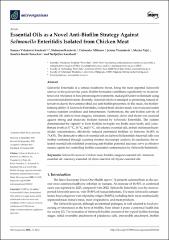| dc.contributor.author | Vidaković Knežević, Suzana | |
| dc.contributor.author | Knežević, Slobodan | |
| dc.contributor.author | Milanov, Dubravka | |
| dc.contributor.author | Vranešević, Jelena | |
| dc.contributor.author | Pajić, Marko | |
| dc.contributor.author | Kocić Tanackov, Sunčica | |
| dc.contributor.author | Karabasil, Neđeljko | |
| dc.date.accessioned | 2025-11-11T09:08:42Z | |
| dc.date.available | 2025-11-11T09:08:42Z | |
| dc.date.issued | 2025 | |
| dc.identifier.citation | : Vidaković Knežević, S.; Knežević, S.; Milanov, D.; Vranešević, J.; Pajić, M.; Kocić-Tanackov, S.; Karabasil, N. Essential Oils as a Novel Anti Biofilm Strategy Against Salmonella Enteritidis Isolated from Chicken Meat. Microorganisms 2025, 13, 2412. https://doi.org/10.3390/ microorganisms13102412 | en_US |
| dc.identifier.issn | 2076-2607 | |
| dc.identifier.uri | https://repo.niv.ns.ac.rs/xmlui/handle/123456789/1063 | |
| dc.description.abstract | Salmonella Enteritidis is a serious foodborne threat, being the most reported Salmonella
serovar in the past several years. Biofilm formation contributes significantly to its persis tence and resistance in food processing environments, making it harder to eliminate using
conventional disinfectants. Recently, essential oils have emerged as promising natural al ternatives due to their antimicrobial and anti-biofilm properties. In this study, the biofilm forming ability of Salmonella Enteritidis, isolated from chicken meat, was evaluated under
various nutrient conditions and temperatures. Furthermore, the anti-biofilm activity of
essential oils derived from oregano, cinnamon, rosemary, clove, and thyme was assessed
against strong and moderate biofilms formed by Salmonella Enteritidis. The isolates
demonstrated the capacity to form biofilms in tryptic soy broth, meat broth, and Luria–
Bertani broth at 37 °C, 15 °C, and 5 °C. All selected essential oils, at their minimum bacte ricidal concentrations, effectively reduced preformed biofilms by between 36.98% to
74.83%. The destructive effect of essential oils on Salmonella Enteritidis bacterial cells was
further confirmed through scanning electron microscopy analysis. In conclusion, the se lected essential oils exhibited promising anti-biofilm potential and may serve as effective
natural agents for controlling biofilm-associated contamination by Salmonella Enteritidis. | en_US |
| dc.description.sponsorship | This research was funded by the Ministry of Science, Technological Development and Innovation of the Republic of Serbia through the Contract of Implementation and Funding of Research Work at NIV-NS in 2025 (Contract No: 451-03-136/2025-03/200031). | en_US |
| dc.language.iso | en | en_US |
| dc.source | Microorganisms | en_US |
| dc.subject | Salmonella serovar | en_US |
| dc.subject | chicken meat | en_US |
| dc.subject | biofilm | en_US |
| dc.subject | oregano essential oil | en_US |
| dc.subject | cinnamon essential oil | en_US |
| dc.subject | rosemary essential oil | en_US |
| dc.subject | clove essential oil | en_US |
| dc.subject | thyme essential oils | en_US |
| dc.title | Essential Oils as a Novel Anti-Biofilm Strategy Against Salmonella Enteritidis Isolated from Chicken Meat | en_US |
| dc.type | Article | en_US |
| dc.identifier.doi | 10.3390/microorganisms13102412 | |
| dc.citation.volume | 13 | en_US |
| dc.citation.spage | 2412 | en_US |
| dc.citation.epage | 2412 | en_US |
| dc.citation.rank | M21 | en_US |
| dc.type.version | published | en_US |

